Can you heat up overnight oats? Absolutely! You can let your oatmeal soak in the fridge overnight and warm it up in the morning. It's a simple process, just microwave or warm it on the stovetop, and you'll have a hearty, nourishing breakfast without any fuss.
While overnight oats are usually enjoyed cold - perfect for warmer months - you might crave a warm breakfast alternative for cooler days. Adding a touch of warmth enhances the comforting flavors, and the texture remains pleasantly chewy, offering a satisfying twist to your morning routine.
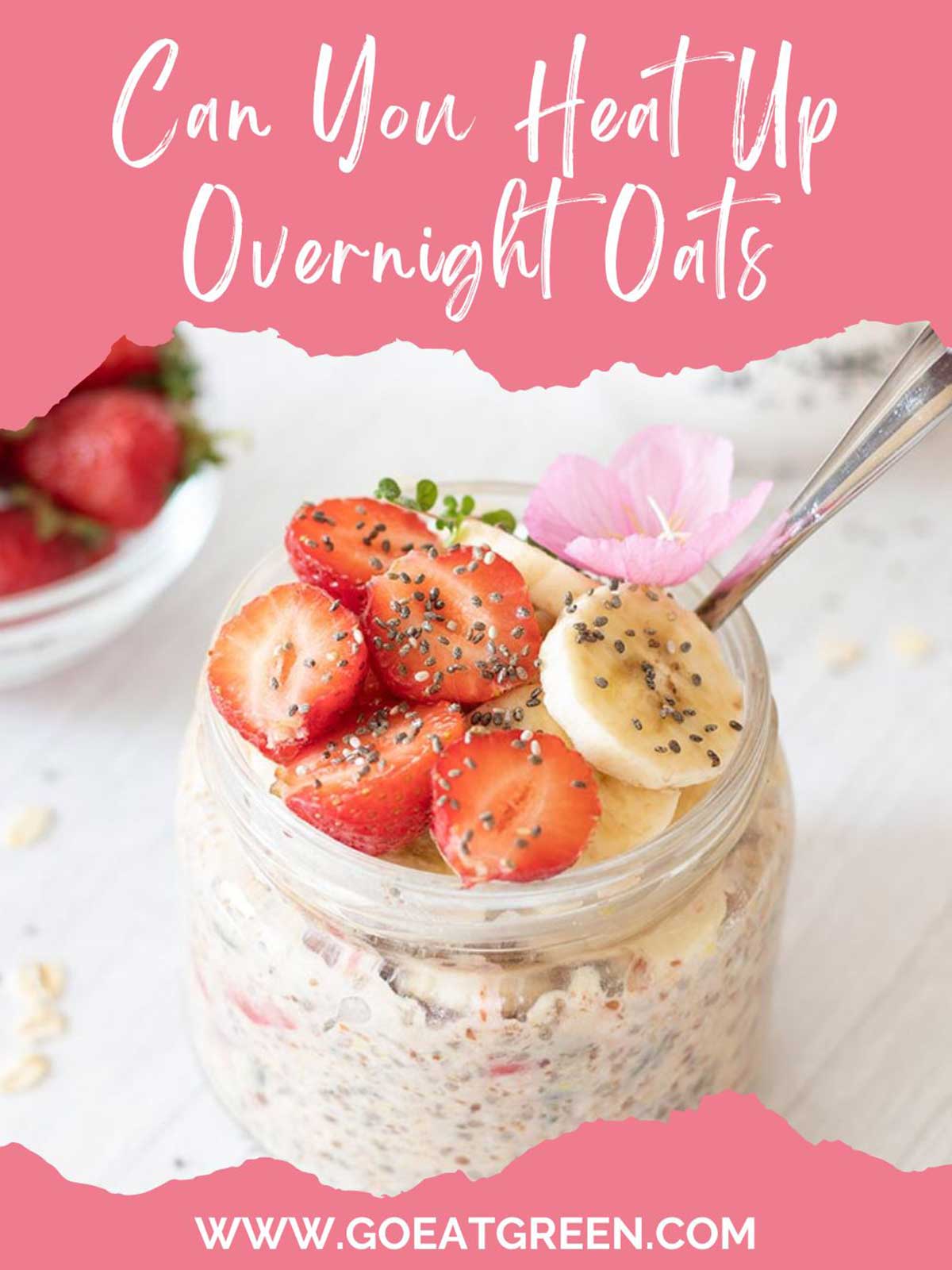
Are you up for an effortless and weight-loss friendly breakfast that's perfect for meal prep? Check out my recipes for apple pb overnight oats, cinnamon roll overnight oats, or cookie dough overnight oats! These delicious options will add a delightful twist to your mornings and make meal preparation a breeze.
Jump to:
Microwave Method
The most efficient way to warm up overnight oats is by using the microwave -convenient, tidy, and time-saving.
- Place overnight oats in a microwave-safe bowl.
- Add a bit more liquid and stir.
- Heat in 30-second intervals, stirring between, until reaching your desired warmth.
- Keep a close eye on the oats as you microwave them. If you notice any bubbling, stop microwaving immediately. Right out of the microwave, the oats might seem a bit loose and watery, but that's okay. Let them sit for a few minutes, and they will thicken up.
- Top with your favorite toppings and enjoy a quick, cozy breakfast or snack.
Tip: It's crucial to have the liquid very hot and almost boiling for the oatmeal to become creamy. However, be cautious, as once the liquid reaches a full boil in the microwave, the oats can bubble up and overflow from the container. I recommend you use a transparent container that can hold at least twice the volume of oats you're preparing to prevent overflow.
Stovetop Method
If you have extra time, you can warm up overnight oats on the stovetop. Just be careful not to burn them.
- Pour enough liquid to cover the saucepan's bottom and heat over medium.
- When it slightly boils, add overnight oats and reduce heat to low.
- Stir constantly until warm. Add toppings and enjoy!
Tip: You can use your favorite milk (such as oat milk or almond milk) or water to reheat the oats. For added creaminess, toss in a bit of plant-based yogurt or a splash of milk after heating.
Cooking a single serving of oatmeal on the stovetop can be challenging. If you opt for stovetop cooking rather than using the microwave, I suggest preparing a minimum of two servings at once. Additionally, when heating a small portion, consider using a smaller saucepan for better results.
What happens to oats when heated?
- Softening - Oats get softer when heated because the starches in them swell up and absorb water.
- Protein change - The proteins in oats can slightly change their molecular structure when exposed to heat.
- Aroma release - Heating oats brings out their smell, making them more aromatic.
- Resistant starch decrease - Resistant starch, good for gut health, may decrease when oats are heated.
- Nutrient impact -Some heat-sensitive nutrients in oats may be slightly reduced. While cooking can lead to a slight loss of certain heat-sensitive vitamins and antioxidants, the impact is generally considered minimal.
It's important to note that the specific changes depend on factors such as the cooking method, time, and temperature. For example, steel-cut oats may undergo less processing and retain more of their natural structure compared to instant oats during cooking.
Does the texture change when heated?
During the cooking process, oats soak up liquid. The longer they're in the fridge, the more liquid they absorb, altering their texture.
To enhance richness and creaminess, add milk or water when warming your overnight oats. For an extra flavor burst, top them with fresh or dried fruit, nuts, or seeds. If you're a fan of yogurt or peanut butter, adding them on top after heating ensures the best taste and texture.
Is it better to eat overnight oats or hot oats?
Both overnight oats and cooked oats are nutritious, but they have some differences. Oats are highly beneficial, they are an excellent source of dietary fiber, quality plant protein, complex carbohydrates, and powerful antioxidants. They also provide essential minerals like manganese, phosphorus, magnesium, copper, B vitamins, iron, selenium, and zinc.
The soluble fiber known as beta-glucans in this grain provides a range of health advantages, such as reducing cholesterol, enhancing heart health, and lowering blood sugar and insulin responses
In terms of benefits, overnight oats contain more resistant starch, a unique fiber that supports a healthy digestive system by nourishing beneficial gut bacteria. Additionally, overnight oats retain more natural nutrients as they are not exposed to high heat during cooking. In contrast, when you cook oats, they have a higher glycemic index compared to overnight oats, potentially causing a quicker rise in blood sugar levels. However, you can reduce this effect by choosing steel-cut oats or cooking them for a shorter time to preserve the oats' natural structure.
The preference between overnight oats and hot oats depends on personal taste. Overnight oats offer convenience and a chilled option, while hot oats provide a warm, traditional feel.
For a detailed overview, take a look at my article covering the impressive health benefits of overnight oats.
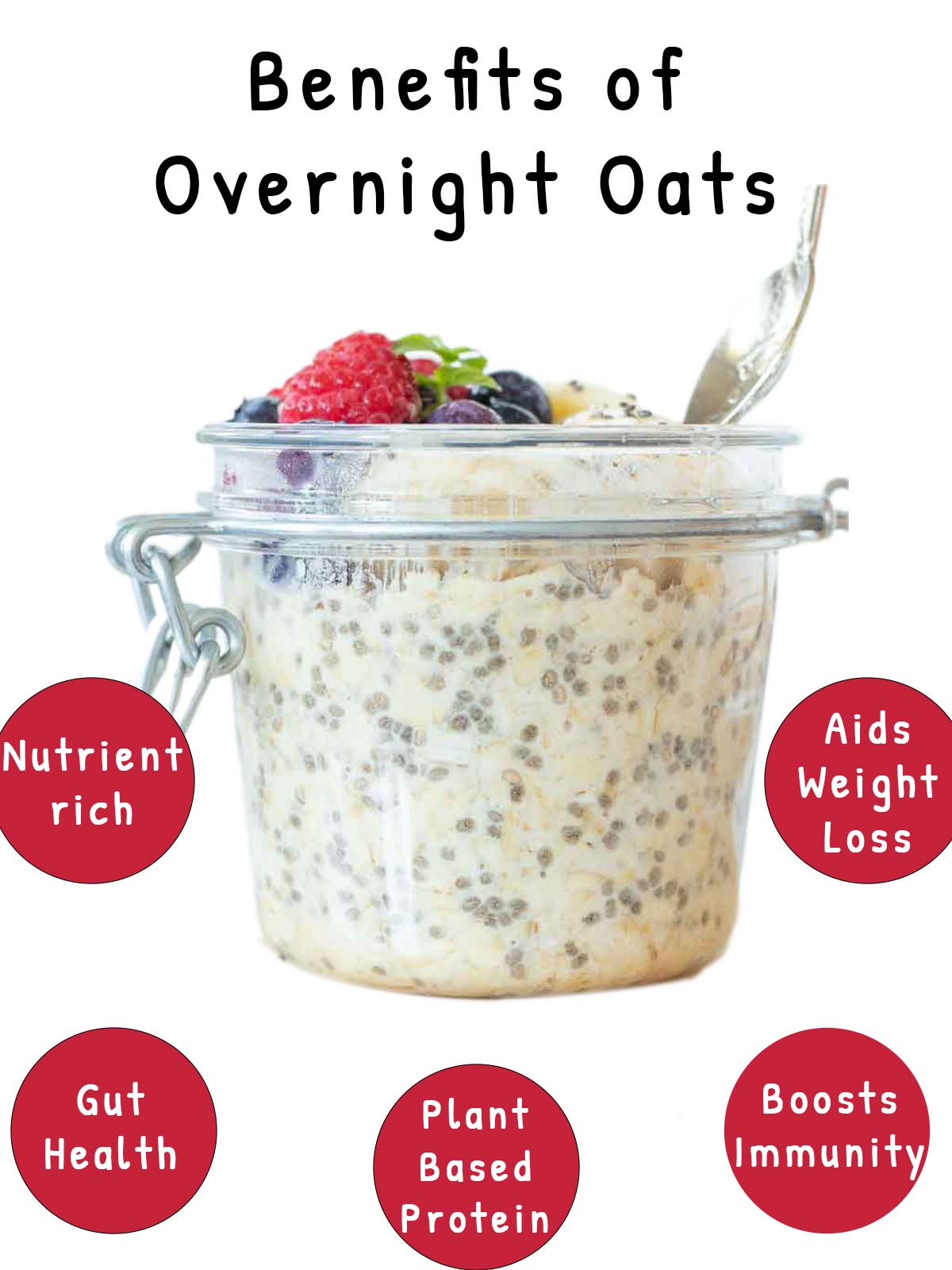
Frequently Asked Questions (FAQ's)
Certainly! Heating up overnight oats is a fantastic idea. It not only enhances their creaminess but also adds a comforting warmth. Simply warm them with a bit of milk or water, and you'll have a healthy and satisfying treat to kickstart your day!
Overnight oats don't need cooking because they soak in liquid (like milk or yogurt) overnight. The soaking process allows the oats to absorb the moisture from liquids like milk, yogurt, or any other preferred liquid, which makes them soft and palatable.
Yes, it is generally okay to eat overnight oats every day as part of a balanced and varied diet. Overnight oats can be a healthy breakfast option, providing a good source of fiber, whole grains, and essential nutrients. However, it's important to ensure that your overall diet includes a variety of foods to meet all your nutritional needs.
Additionally, be mindful of the ingredients you add to your overnight oats. Including a mix of fruits, nuts, seeds, and other nutritious toppings can enhance the nutritional value. Pay attention to portion sizes, as excessive consumption may contribute to excess calorie intake.
Yes, you can warm up overnight oats with protein powder. Note that the texture or flavor of some proteins may change when heated. Adding protein powder to your oatmeal gives you an extra energy boost for the day, aiding in muscle strength and providing sustained energy. It's an ideal breakfast choice for those conscious of their diet, offering a wholesome blend of protein powder and oatmeal.
Of course, you can reheat overnight oats with yogurt. Simply warm them in the microwave or on the stove, stirring occasionally until they reach your desired temperature.
Vegan Overnight Oatmeal Recipes
- Vegan Peach Pie Overnight Oats (No Yogurt)
- Blueberry Lemon Overnight Oats For Weight Loss
- Chocolate Peanut Butter Blended Overnight Oats (No Banana)
- Make-Ahead Vegan Strawberry Overnight Oats (No Cooking Required!)
- Overnight Oats With Frozen Fruit (No Yogurt)
- Nutella Overnight Oats (With Homemade Hazelnut Spread)
- Overnight Quinoa Oats (Protein Make-Ahead Breakfast)
- Applesauce Overnight Oats (With Cinnamon and Peanut Butter)
Do you heat up your overnight oats? I'd love to know your breakfast routine! Are you all about cozying up to warm oats, or do you prefer the refreshing chill of cold oats?
Join our community! Subscribe and receive weekly recipe inspiration delivered straight to your inbox.



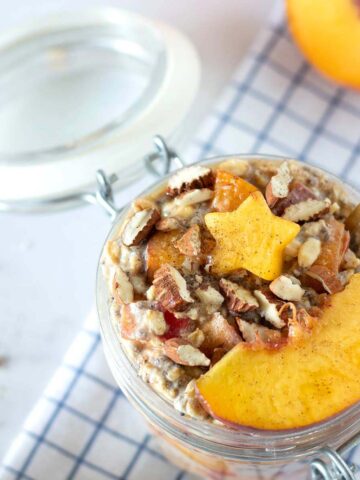
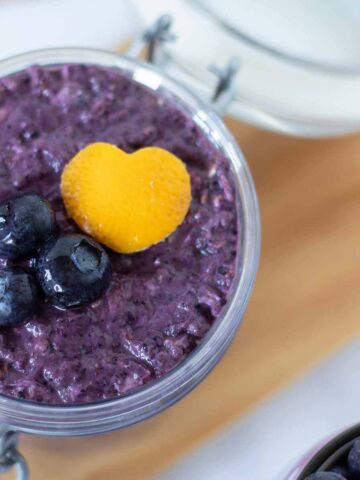
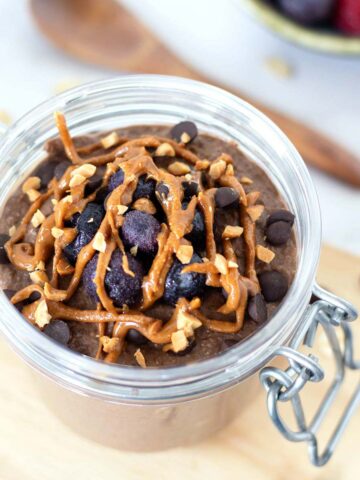
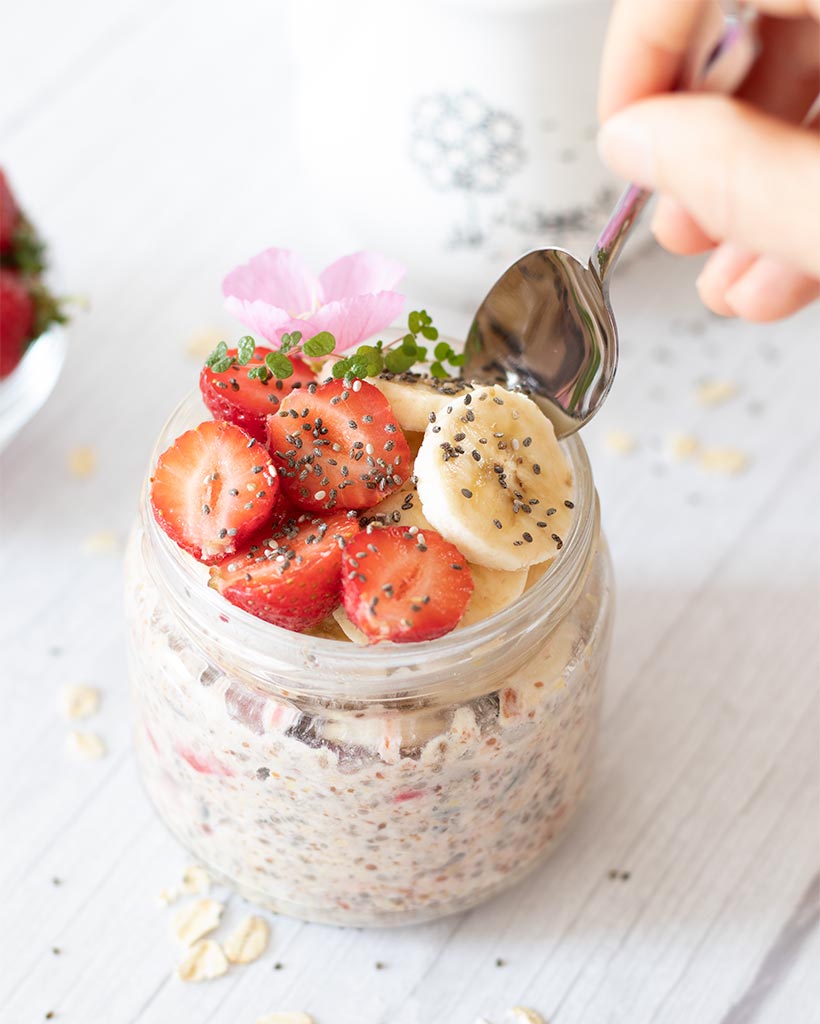

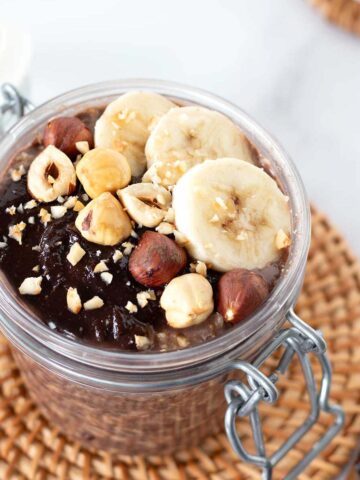
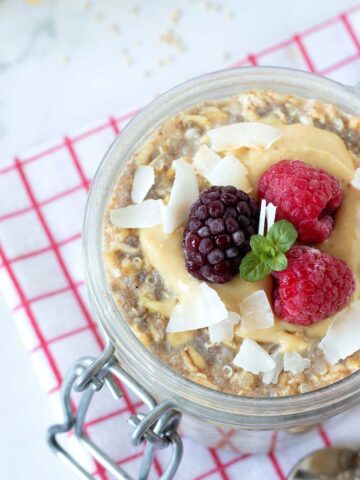
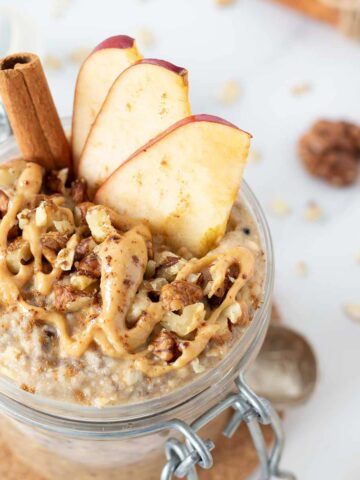
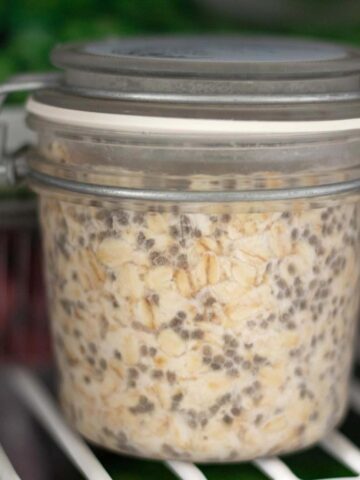
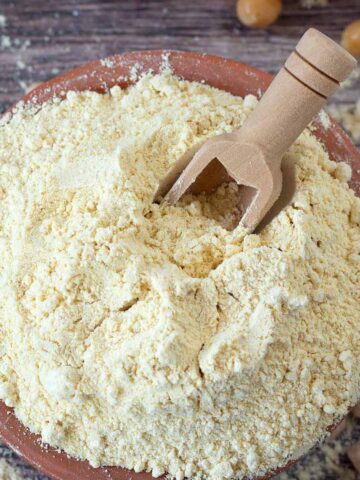

Comments
No Comments